Property and Real Estate Law: George's Eviction and Inheritance
VerifiedAdded on 2022/12/26
|8
|2498
|1
Homework Assignment
AI Summary
This assignment analyzes a property and real estate law case involving George, who faces potential eviction after his daughter's death. The case explores the implications of joint tenancy versus tenants-in-common, the role of wills, and the rights of beneficiaries. The solution examines Singapore property law, highlighting the importance of agreements and the right of survivorship. The analysis considers whether George can be evicted and how the outcome would differ if the property was held as tenants-in-common and George was named as the sole beneficiary in Rose’s will. The assignment emphasizes the legal principles governing property ownership, inheritance, and the protection of property rights, providing a comprehensive understanding of the legal aspects of the case.
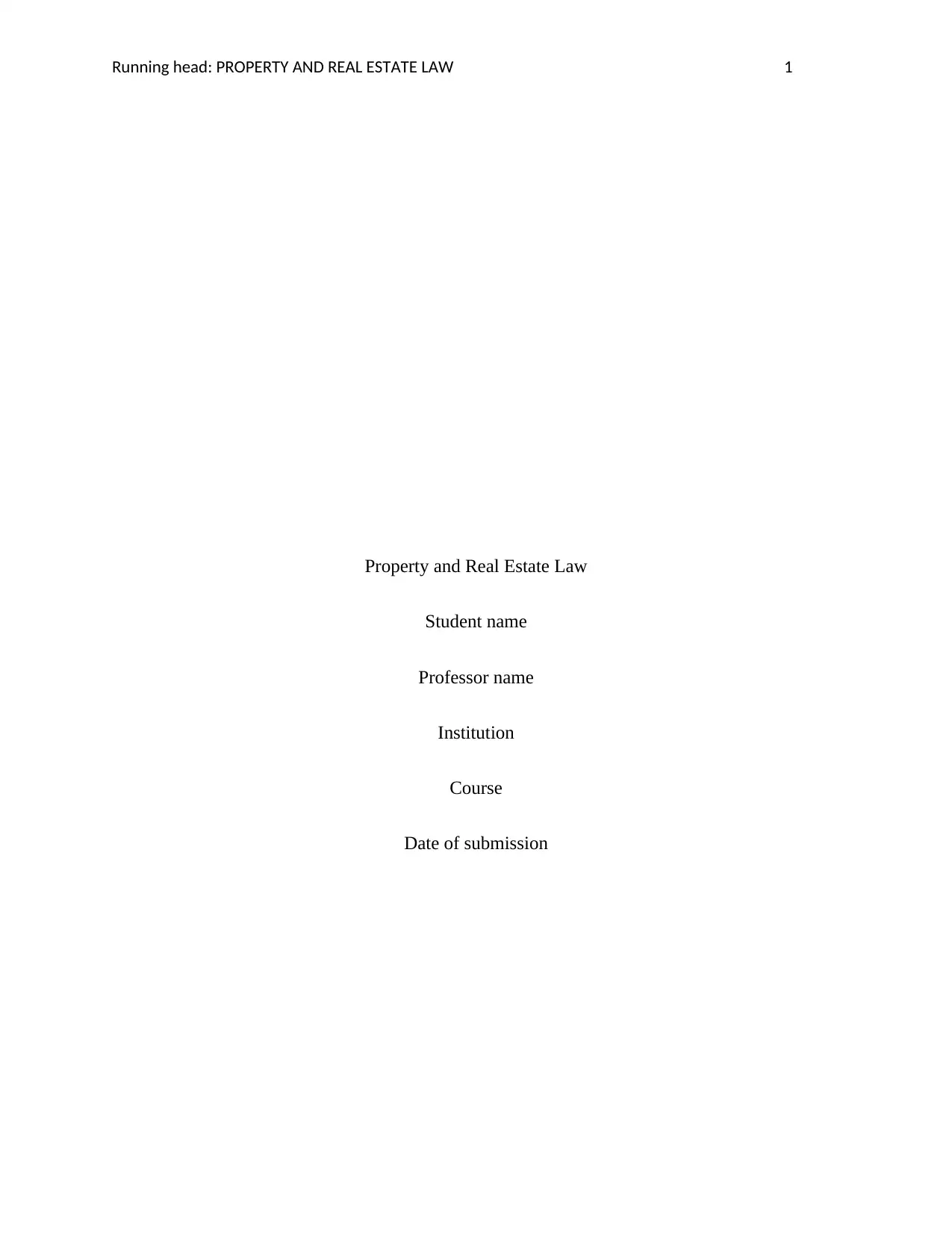
Running head: PROPERTY AND REAL ESTATE LAW 1
Property and Real Estate Law
Student name
Professor name
Institution
Course
Date of submission
Property and Real Estate Law
Student name
Professor name
Institution
Course
Date of submission
Paraphrase This Document
Need a fresh take? Get an instant paraphrase of this document with our AI Paraphraser
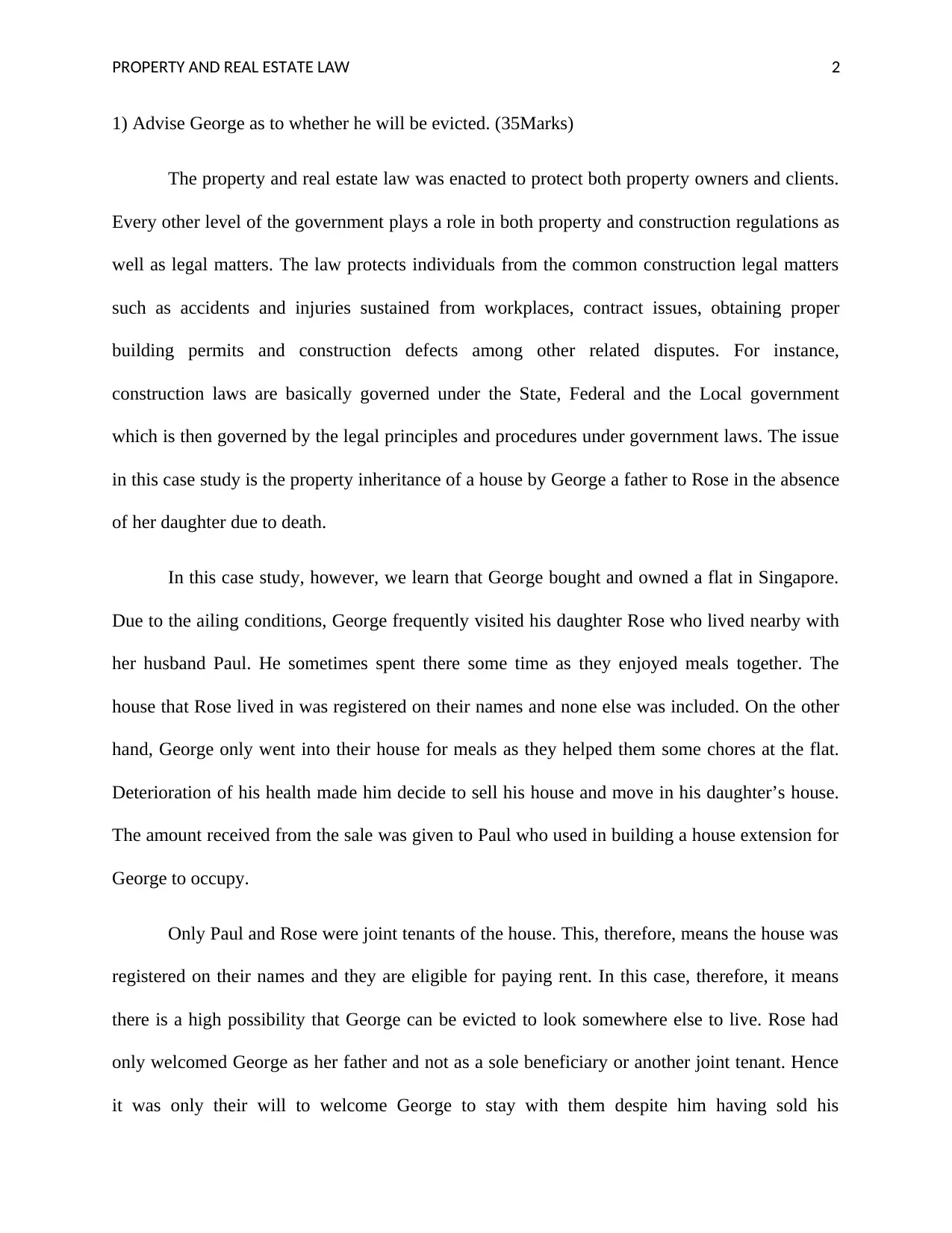
PROPERTY AND REAL ESTATE LAW 2
1) Advise George as to whether he will be evicted. (35Marks)
The property and real estate law was enacted to protect both property owners and clients.
Every other level of the government plays a role in both property and construction regulations as
well as legal matters. The law protects individuals from the common construction legal matters
such as accidents and injuries sustained from workplaces, contract issues, obtaining proper
building permits and construction defects among other related disputes. For instance,
construction laws are basically governed under the State, Federal and the Local government
which is then governed by the legal principles and procedures under government laws. The issue
in this case study is the property inheritance of a house by George a father to Rose in the absence
of her daughter due to death.
In this case study, however, we learn that George bought and owned a flat in Singapore.
Due to the ailing conditions, George frequently visited his daughter Rose who lived nearby with
her husband Paul. He sometimes spent there some time as they enjoyed meals together. The
house that Rose lived in was registered on their names and none else was included. On the other
hand, George only went into their house for meals as they helped them some chores at the flat.
Deterioration of his health made him decide to sell his house and move in his daughter’s house.
The amount received from the sale was given to Paul who used in building a house extension for
George to occupy.
Only Paul and Rose were joint tenants of the house. This, therefore, means the house was
registered on their names and they are eligible for paying rent. In this case, therefore, it means
there is a high possibility that George can be evicted to look somewhere else to live. Rose had
only welcomed George as her father and not as a sole beneficiary or another joint tenant. Hence
it was only their will to welcome George to stay with them despite him having sold his
1) Advise George as to whether he will be evicted. (35Marks)
The property and real estate law was enacted to protect both property owners and clients.
Every other level of the government plays a role in both property and construction regulations as
well as legal matters. The law protects individuals from the common construction legal matters
such as accidents and injuries sustained from workplaces, contract issues, obtaining proper
building permits and construction defects among other related disputes. For instance,
construction laws are basically governed under the State, Federal and the Local government
which is then governed by the legal principles and procedures under government laws. The issue
in this case study is the property inheritance of a house by George a father to Rose in the absence
of her daughter due to death.
In this case study, however, we learn that George bought and owned a flat in Singapore.
Due to the ailing conditions, George frequently visited his daughter Rose who lived nearby with
her husband Paul. He sometimes spent there some time as they enjoyed meals together. The
house that Rose lived in was registered on their names and none else was included. On the other
hand, George only went into their house for meals as they helped them some chores at the flat.
Deterioration of his health made him decide to sell his house and move in his daughter’s house.
The amount received from the sale was given to Paul who used in building a house extension for
George to occupy.
Only Paul and Rose were joint tenants of the house. This, therefore, means the house was
registered on their names and they are eligible for paying rent. In this case, therefore, it means
there is a high possibility that George can be evicted to look somewhere else to live. Rose had
only welcomed George as her father and not as a sole beneficiary or another joint tenant. Hence
it was only their will to welcome George to stay with them despite him having sold his
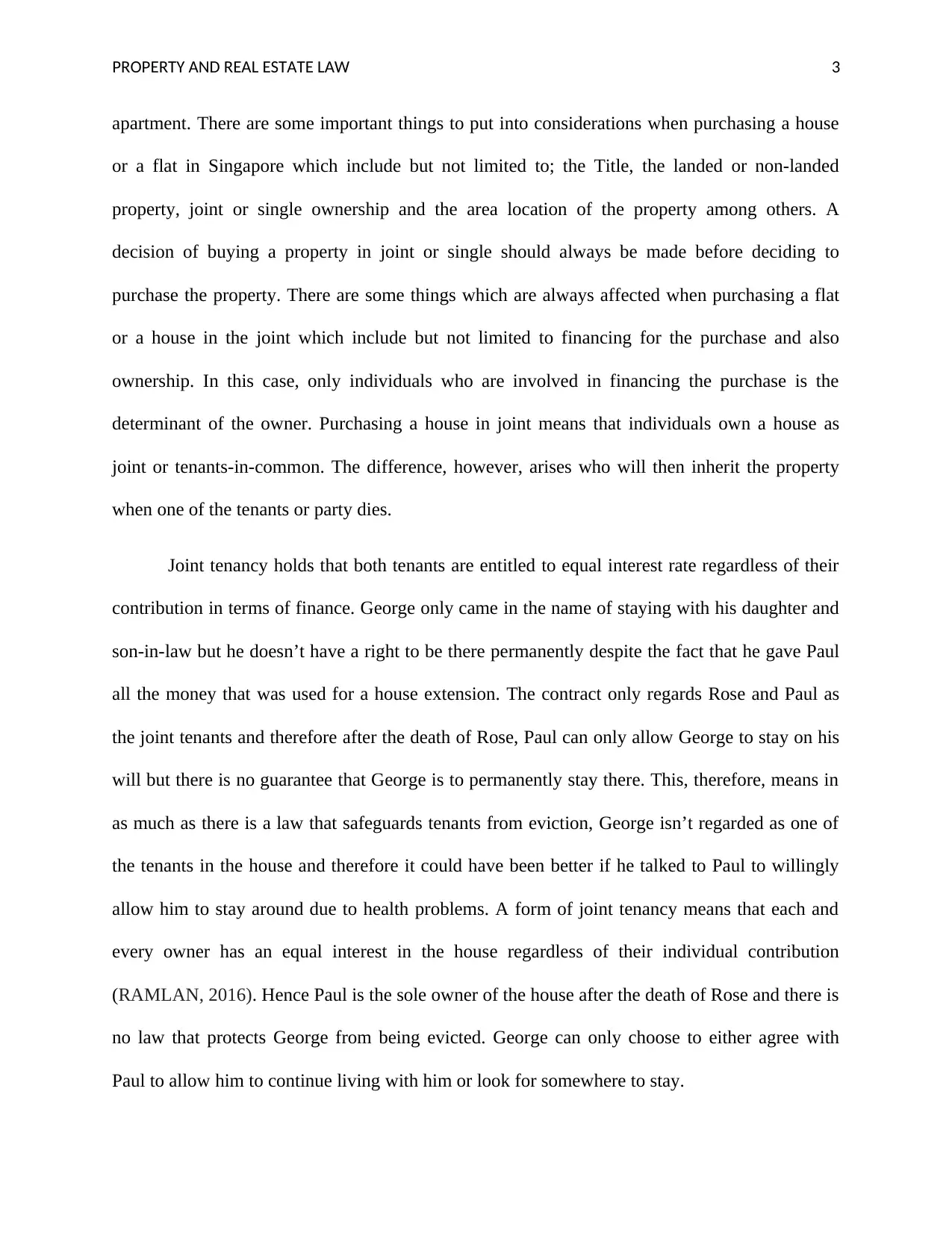
PROPERTY AND REAL ESTATE LAW 3
apartment. There are some important things to put into considerations when purchasing a house
or a flat in Singapore which include but not limited to; the Title, the landed or non-landed
property, joint or single ownership and the area location of the property among others. A
decision of buying a property in joint or single should always be made before deciding to
purchase the property. There are some things which are always affected when purchasing a flat
or a house in the joint which include but not limited to financing for the purchase and also
ownership. In this case, only individuals who are involved in financing the purchase is the
determinant of the owner. Purchasing a house in joint means that individuals own a house as
joint or tenants-in-common. The difference, however, arises who will then inherit the property
when one of the tenants or party dies.
Joint tenancy holds that both tenants are entitled to equal interest rate regardless of their
contribution in terms of finance. George only came in the name of staying with his daughter and
son-in-law but he doesn’t have a right to be there permanently despite the fact that he gave Paul
all the money that was used for a house extension. The contract only regards Rose and Paul as
the joint tenants and therefore after the death of Rose, Paul can only allow George to stay on his
will but there is no guarantee that George is to permanently stay there. This, therefore, means in
as much as there is a law that safeguards tenants from eviction, George isn’t regarded as one of
the tenants in the house and therefore it could have been better if he talked to Paul to willingly
allow him to stay around due to health problems. A form of joint tenancy means that each and
every owner has an equal interest in the house regardless of their individual contribution
(RAMLAN, 2016). Hence Paul is the sole owner of the house after the death of Rose and there is
no law that protects George from being evicted. George can only choose to either agree with
Paul to allow him to continue living with him or look for somewhere to stay.
apartment. There are some important things to put into considerations when purchasing a house
or a flat in Singapore which include but not limited to; the Title, the landed or non-landed
property, joint or single ownership and the area location of the property among others. A
decision of buying a property in joint or single should always be made before deciding to
purchase the property. There are some things which are always affected when purchasing a flat
or a house in the joint which include but not limited to financing for the purchase and also
ownership. In this case, only individuals who are involved in financing the purchase is the
determinant of the owner. Purchasing a house in joint means that individuals own a house as
joint or tenants-in-common. The difference, however, arises who will then inherit the property
when one of the tenants or party dies.
Joint tenancy holds that both tenants are entitled to equal interest rate regardless of their
contribution in terms of finance. George only came in the name of staying with his daughter and
son-in-law but he doesn’t have a right to be there permanently despite the fact that he gave Paul
all the money that was used for a house extension. The contract only regards Rose and Paul as
the joint tenants and therefore after the death of Rose, Paul can only allow George to stay on his
will but there is no guarantee that George is to permanently stay there. This, therefore, means in
as much as there is a law that safeguards tenants from eviction, George isn’t regarded as one of
the tenants in the house and therefore it could have been better if he talked to Paul to willingly
allow him to stay around due to health problems. A form of joint tenancy means that each and
every owner has an equal interest in the house regardless of their individual contribution
(RAMLAN, 2016). Hence Paul is the sole owner of the house after the death of Rose and there is
no law that protects George from being evicted. George can only choose to either agree with
Paul to allow him to continue living with him or look for somewhere to stay.
⊘ This is a preview!⊘
Do you want full access?
Subscribe today to unlock all pages.

Trusted by 1+ million students worldwide
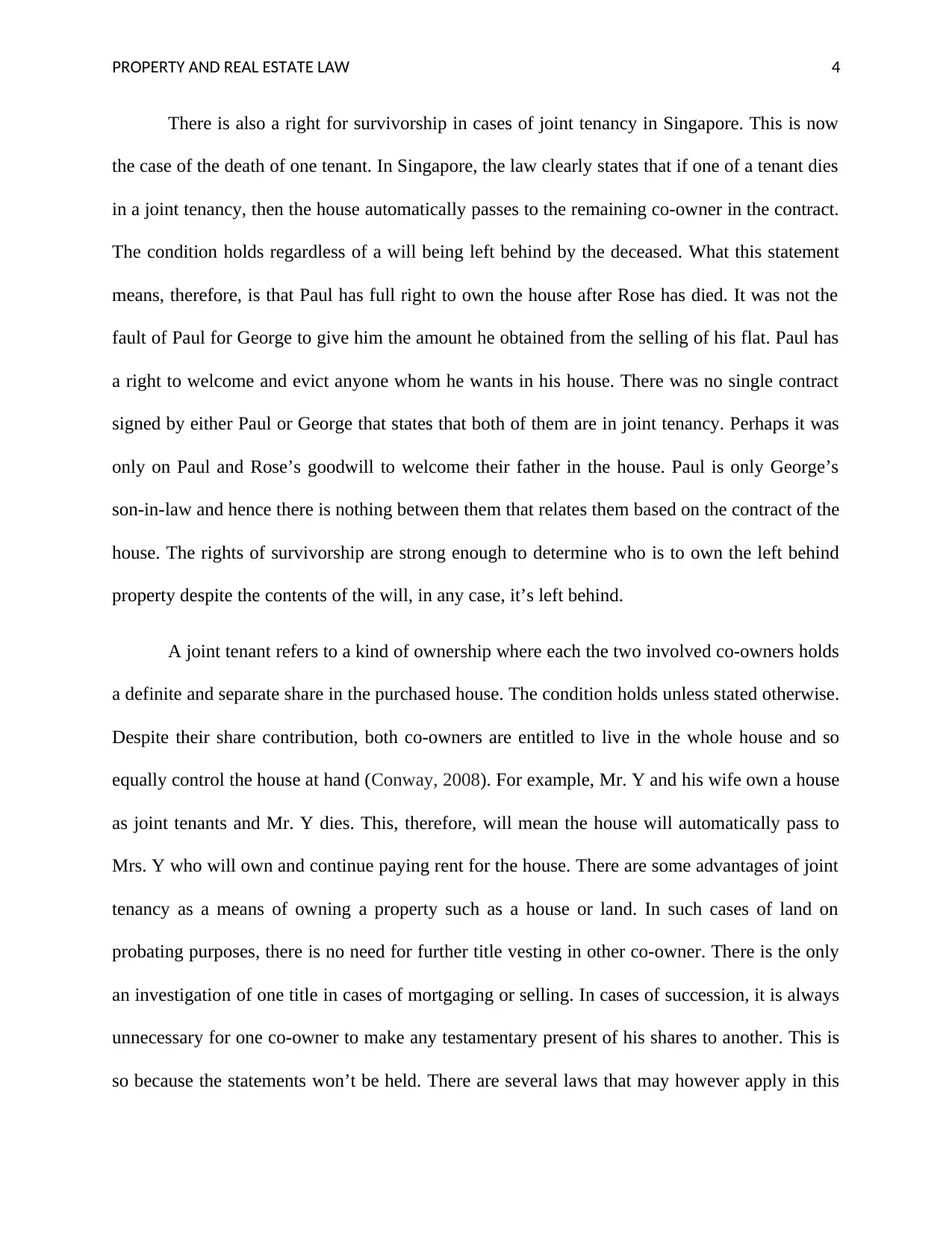
PROPERTY AND REAL ESTATE LAW 4
There is also a right for survivorship in cases of joint tenancy in Singapore. This is now
the case of the death of one tenant. In Singapore, the law clearly states that if one of a tenant dies
in a joint tenancy, then the house automatically passes to the remaining co-owner in the contract.
The condition holds regardless of a will being left behind by the deceased. What this statement
means, therefore, is that Paul has full right to own the house after Rose has died. It was not the
fault of Paul for George to give him the amount he obtained from the selling of his flat. Paul has
a right to welcome and evict anyone whom he wants in his house. There was no single contract
signed by either Paul or George that states that both of them are in joint tenancy. Perhaps it was
only on Paul and Rose’s goodwill to welcome their father in the house. Paul is only George’s
son-in-law and hence there is nothing between them that relates them based on the contract of the
house. The rights of survivorship are strong enough to determine who is to own the left behind
property despite the contents of the will, in any case, it’s left behind.
A joint tenant refers to a kind of ownership where each the two involved co-owners holds
a definite and separate share in the purchased house. The condition holds unless stated otherwise.
Despite their share contribution, both co-owners are entitled to live in the whole house and so
equally control the house at hand (Conway, 2008). For example, Mr. Y and his wife own a house
as joint tenants and Mr. Y dies. This, therefore, will mean the house will automatically pass to
Mrs. Y who will own and continue paying rent for the house. There are some advantages of joint
tenancy as a means of owning a property such as a house or land. In such cases of land on
probating purposes, there is no need for further title vesting in other co-owner. There is the only
an investigation of one title in cases of mortgaging or selling. In cases of succession, it is always
unnecessary for one co-owner to make any testamentary present of his shares to another. This is
so because the statements won’t be held. There are several laws that may however apply in this
There is also a right for survivorship in cases of joint tenancy in Singapore. This is now
the case of the death of one tenant. In Singapore, the law clearly states that if one of a tenant dies
in a joint tenancy, then the house automatically passes to the remaining co-owner in the contract.
The condition holds regardless of a will being left behind by the deceased. What this statement
means, therefore, is that Paul has full right to own the house after Rose has died. It was not the
fault of Paul for George to give him the amount he obtained from the selling of his flat. Paul has
a right to welcome and evict anyone whom he wants in his house. There was no single contract
signed by either Paul or George that states that both of them are in joint tenancy. Perhaps it was
only on Paul and Rose’s goodwill to welcome their father in the house. Paul is only George’s
son-in-law and hence there is nothing between them that relates them based on the contract of the
house. The rights of survivorship are strong enough to determine who is to own the left behind
property despite the contents of the will, in any case, it’s left behind.
A joint tenant refers to a kind of ownership where each the two involved co-owners holds
a definite and separate share in the purchased house. The condition holds unless stated otherwise.
Despite their share contribution, both co-owners are entitled to live in the whole house and so
equally control the house at hand (Conway, 2008). For example, Mr. Y and his wife own a house
as joint tenants and Mr. Y dies. This, therefore, will mean the house will automatically pass to
Mrs. Y who will own and continue paying rent for the house. There are some advantages of joint
tenancy as a means of owning a property such as a house or land. In such cases of land on
probating purposes, there is no need for further title vesting in other co-owner. There is the only
an investigation of one title in cases of mortgaging or selling. In cases of succession, it is always
unnecessary for one co-owner to make any testamentary present of his shares to another. This is
so because the statements won’t be held. There are several laws that may however apply in this
Paraphrase This Document
Need a fresh take? Get an instant paraphrase of this document with our AI Paraphraser
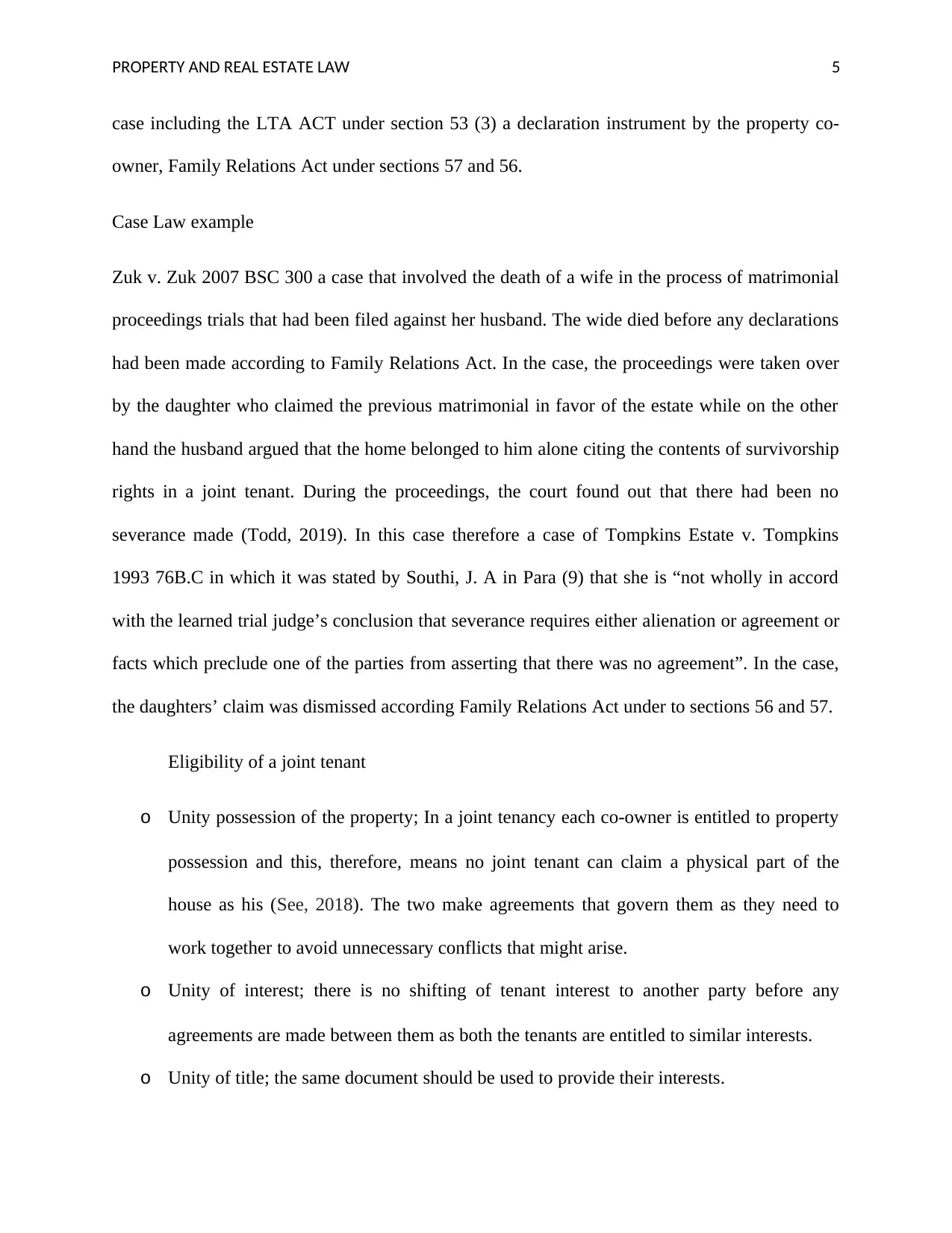
PROPERTY AND REAL ESTATE LAW 5
case including the LTA ACT under section 53 (3) a declaration instrument by the property co-
owner, Family Relations Act under sections 57 and 56.
Case Law example
Zuk v. Zuk 2007 BSC 300 a case that involved the death of a wife in the process of matrimonial
proceedings trials that had been filed against her husband. The wide died before any declarations
had been made according to Family Relations Act. In the case, the proceedings were taken over
by the daughter who claimed the previous matrimonial in favor of the estate while on the other
hand the husband argued that the home belonged to him alone citing the contents of survivorship
rights in a joint tenant. During the proceedings, the court found out that there had been no
severance made (Todd, 2019). In this case therefore a case of Tompkins Estate v. Tompkins
1993 76B.C in which it was stated by Southi, J. A in Para (9) that she is “not wholly in accord
with the learned trial judge’s conclusion that severance requires either alienation or agreement or
facts which preclude one of the parties from asserting that there was no agreement”. In the case,
the daughters’ claim was dismissed according Family Relations Act under to sections 56 and 57.
Eligibility of a joint tenant
o Unity possession of the property; In a joint tenancy each co-owner is entitled to property
possession and this, therefore, means no joint tenant can claim a physical part of the
house as his (See, 2018). The two make agreements that govern them as they need to
work together to avoid unnecessary conflicts that might arise.
o Unity of interest; there is no shifting of tenant interest to another party before any
agreements are made between them as both the tenants are entitled to similar interests.
o Unity of title; the same document should be used to provide their interests.
case including the LTA ACT under section 53 (3) a declaration instrument by the property co-
owner, Family Relations Act under sections 57 and 56.
Case Law example
Zuk v. Zuk 2007 BSC 300 a case that involved the death of a wife in the process of matrimonial
proceedings trials that had been filed against her husband. The wide died before any declarations
had been made according to Family Relations Act. In the case, the proceedings were taken over
by the daughter who claimed the previous matrimonial in favor of the estate while on the other
hand the husband argued that the home belonged to him alone citing the contents of survivorship
rights in a joint tenant. During the proceedings, the court found out that there had been no
severance made (Todd, 2019). In this case therefore a case of Tompkins Estate v. Tompkins
1993 76B.C in which it was stated by Southi, J. A in Para (9) that she is “not wholly in accord
with the learned trial judge’s conclusion that severance requires either alienation or agreement or
facts which preclude one of the parties from asserting that there was no agreement”. In the case,
the daughters’ claim was dismissed according Family Relations Act under to sections 56 and 57.
Eligibility of a joint tenant
o Unity possession of the property; In a joint tenancy each co-owner is entitled to property
possession and this, therefore, means no joint tenant can claim a physical part of the
house as his (See, 2018). The two make agreements that govern them as they need to
work together to avoid unnecessary conflicts that might arise.
o Unity of interest; there is no shifting of tenant interest to another party before any
agreements are made between them as both the tenants are entitled to similar interests.
o Unity of title; the same document should be used to provide their interests.
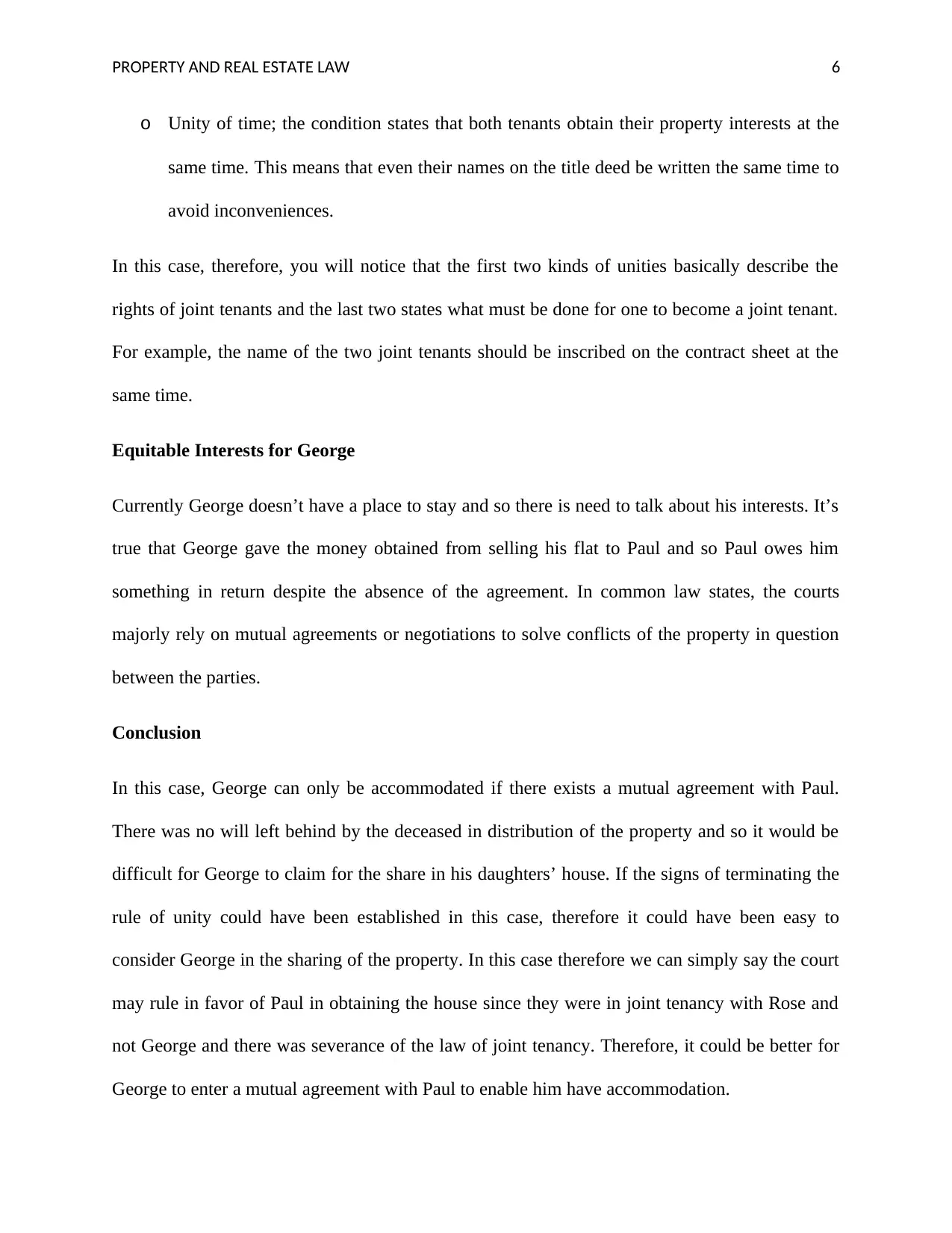
PROPERTY AND REAL ESTATE LAW 6
o Unity of time; the condition states that both tenants obtain their property interests at the
same time. This means that even their names on the title deed be written the same time to
avoid inconveniences.
In this case, therefore, you will notice that the first two kinds of unities basically describe the
rights of joint tenants and the last two states what must be done for one to become a joint tenant.
For example, the name of the two joint tenants should be inscribed on the contract sheet at the
same time.
Equitable Interests for George
Currently George doesn’t have a place to stay and so there is need to talk about his interests. It’s
true that George gave the money obtained from selling his flat to Paul and so Paul owes him
something in return despite the absence of the agreement. In common law states, the courts
majorly rely on mutual agreements or negotiations to solve conflicts of the property in question
between the parties.
Conclusion
In this case, George can only be accommodated if there exists a mutual agreement with Paul.
There was no will left behind by the deceased in distribution of the property and so it would be
difficult for George to claim for the share in his daughters’ house. If the signs of terminating the
rule of unity could have been established in this case, therefore it could have been easy to
consider George in the sharing of the property. In this case therefore we can simply say the court
may rule in favor of Paul in obtaining the house since they were in joint tenancy with Rose and
not George and there was severance of the law of joint tenancy. Therefore, it could be better for
George to enter a mutual agreement with Paul to enable him have accommodation.
o Unity of time; the condition states that both tenants obtain their property interests at the
same time. This means that even their names on the title deed be written the same time to
avoid inconveniences.
In this case, therefore, you will notice that the first two kinds of unities basically describe the
rights of joint tenants and the last two states what must be done for one to become a joint tenant.
For example, the name of the two joint tenants should be inscribed on the contract sheet at the
same time.
Equitable Interests for George
Currently George doesn’t have a place to stay and so there is need to talk about his interests. It’s
true that George gave the money obtained from selling his flat to Paul and so Paul owes him
something in return despite the absence of the agreement. In common law states, the courts
majorly rely on mutual agreements or negotiations to solve conflicts of the property in question
between the parties.
Conclusion
In this case, George can only be accommodated if there exists a mutual agreement with Paul.
There was no will left behind by the deceased in distribution of the property and so it would be
difficult for George to claim for the share in his daughters’ house. If the signs of terminating the
rule of unity could have been established in this case, therefore it could have been easy to
consider George in the sharing of the property. In this case therefore we can simply say the court
may rule in favor of Paul in obtaining the house since they were in joint tenancy with Rose and
not George and there was severance of the law of joint tenancy. Therefore, it could be better for
George to enter a mutual agreement with Paul to enable him have accommodation.
⊘ This is a preview!⊘
Do you want full access?
Subscribe today to unlock all pages.

Trusted by 1+ million students worldwide
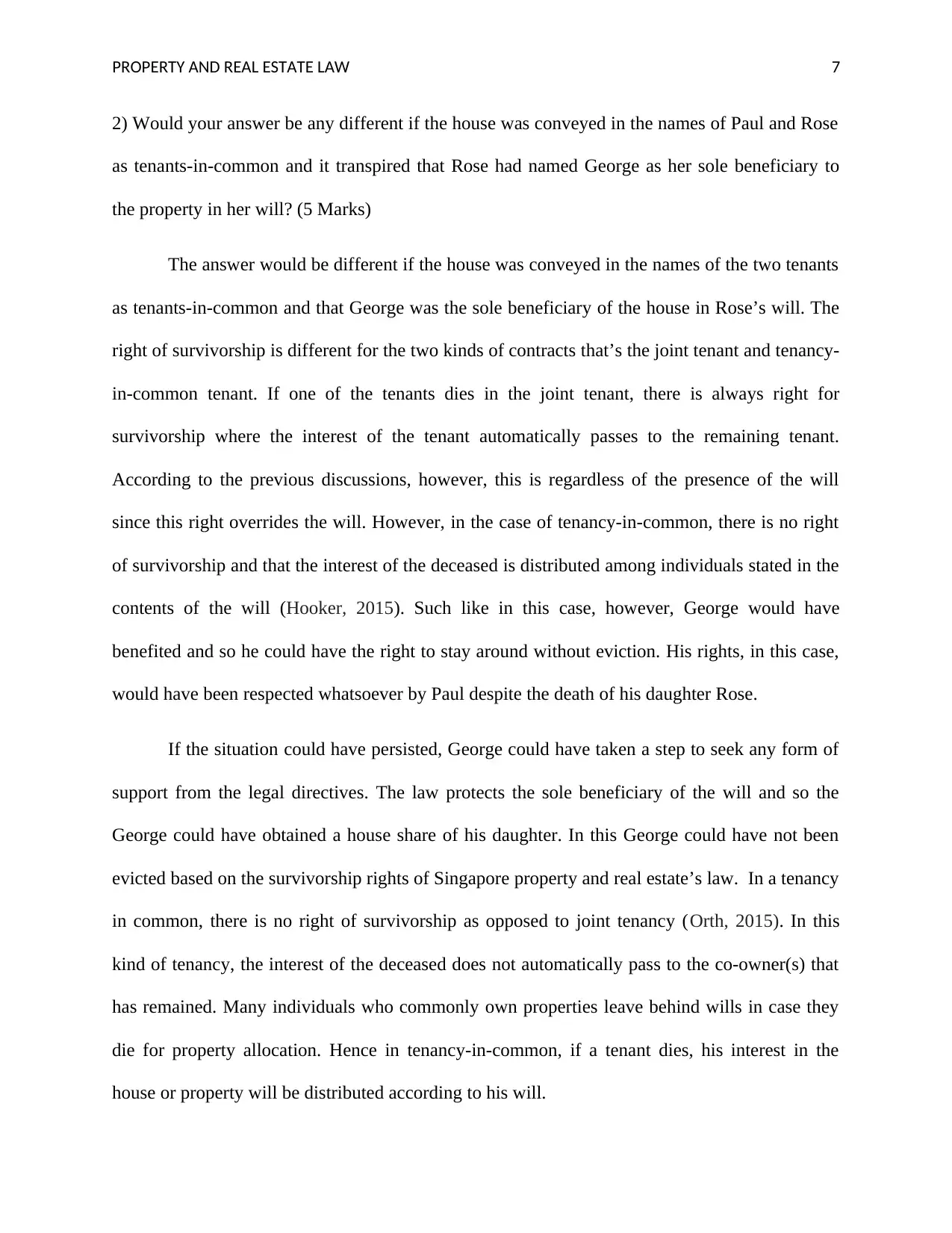
PROPERTY AND REAL ESTATE LAW 7
2) Would your answer be any different if the house was conveyed in the names of Paul and Rose
as tenants-in-common and it transpired that Rose had named George as her sole beneficiary to
the property in her will? (5 Marks)
The answer would be different if the house was conveyed in the names of the two tenants
as tenants-in-common and that George was the sole beneficiary of the house in Rose’s will. The
right of survivorship is different for the two kinds of contracts that’s the joint tenant and tenancy-
in-common tenant. If one of the tenants dies in the joint tenant, there is always right for
survivorship where the interest of the tenant automatically passes to the remaining tenant.
According to the previous discussions, however, this is regardless of the presence of the will
since this right overrides the will. However, in the case of tenancy-in-common, there is no right
of survivorship and that the interest of the deceased is distributed among individuals stated in the
contents of the will (Hooker, 2015). Such like in this case, however, George would have
benefited and so he could have the right to stay around without eviction. His rights, in this case,
would have been respected whatsoever by Paul despite the death of his daughter Rose.
If the situation could have persisted, George could have taken a step to seek any form of
support from the legal directives. The law protects the sole beneficiary of the will and so the
George could have obtained a house share of his daughter. In this George could have not been
evicted based on the survivorship rights of Singapore property and real estate’s law. In a tenancy
in common, there is no right of survivorship as opposed to joint tenancy (Orth, 2015). In this
kind of tenancy, the interest of the deceased does not automatically pass to the co-owner(s) that
has remained. Many individuals who commonly own properties leave behind wills in case they
die for property allocation. Hence in tenancy-in-common, if a tenant dies, his interest in the
house or property will be distributed according to his will.
2) Would your answer be any different if the house was conveyed in the names of Paul and Rose
as tenants-in-common and it transpired that Rose had named George as her sole beneficiary to
the property in her will? (5 Marks)
The answer would be different if the house was conveyed in the names of the two tenants
as tenants-in-common and that George was the sole beneficiary of the house in Rose’s will. The
right of survivorship is different for the two kinds of contracts that’s the joint tenant and tenancy-
in-common tenant. If one of the tenants dies in the joint tenant, there is always right for
survivorship where the interest of the tenant automatically passes to the remaining tenant.
According to the previous discussions, however, this is regardless of the presence of the will
since this right overrides the will. However, in the case of tenancy-in-common, there is no right
of survivorship and that the interest of the deceased is distributed among individuals stated in the
contents of the will (Hooker, 2015). Such like in this case, however, George would have
benefited and so he could have the right to stay around without eviction. His rights, in this case,
would have been respected whatsoever by Paul despite the death of his daughter Rose.
If the situation could have persisted, George could have taken a step to seek any form of
support from the legal directives. The law protects the sole beneficiary of the will and so the
George could have obtained a house share of his daughter. In this George could have not been
evicted based on the survivorship rights of Singapore property and real estate’s law. In a tenancy
in common, there is no right of survivorship as opposed to joint tenancy (Orth, 2015). In this
kind of tenancy, the interest of the deceased does not automatically pass to the co-owner(s) that
has remained. Many individuals who commonly own properties leave behind wills in case they
die for property allocation. Hence in tenancy-in-common, if a tenant dies, his interest in the
house or property will be distributed according to his will.
Paraphrase This Document
Need a fresh take? Get an instant paraphrase of this document with our AI Paraphraser
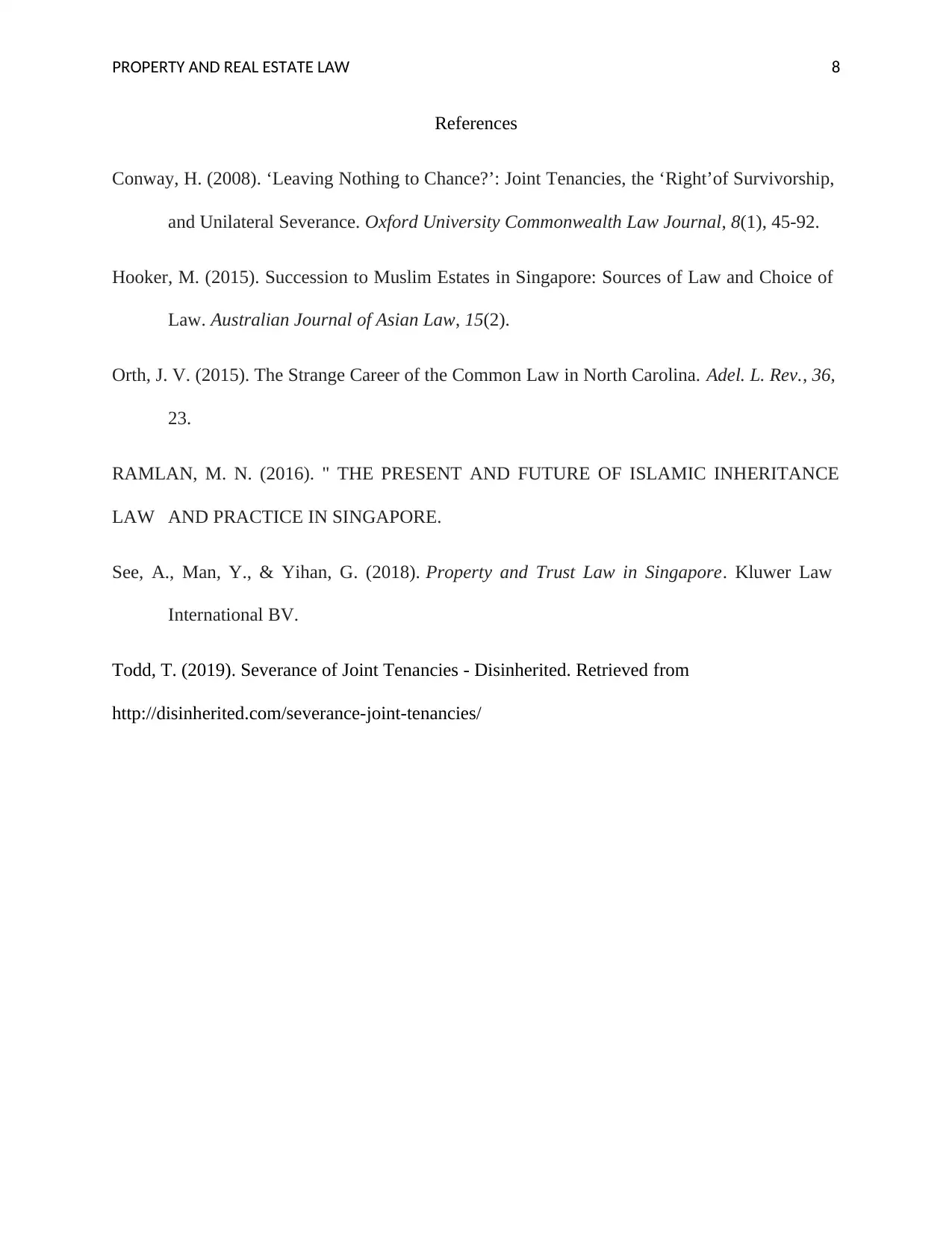
PROPERTY AND REAL ESTATE LAW 8
References
Conway, H. (2008). ‘Leaving Nothing to Chance?’: Joint Tenancies, the ‘Right’of Survivorship,
and Unilateral Severance. Oxford University Commonwealth Law Journal, 8(1), 45-92.
Hooker, M. (2015). Succession to Muslim Estates in Singapore: Sources of Law and Choice of
Law. Australian Journal of Asian Law, 15(2).
Orth, J. V. (2015). The Strange Career of the Common Law in North Carolina. Adel. L. Rev., 36,
23.
RAMLAN, M. N. (2016). " THE PRESENT AND FUTURE OF ISLAMIC INHERITANCE
LAW AND PRACTICE IN SINGAPORE.
See, A., Man, Y., & Yihan, G. (2018). Property and Trust Law in Singapore. Kluwer Law
International BV.
Todd, T. (2019). Severance of Joint Tenancies - Disinherited. Retrieved from
http://disinherited.com/severance-joint-tenancies/
References
Conway, H. (2008). ‘Leaving Nothing to Chance?’: Joint Tenancies, the ‘Right’of Survivorship,
and Unilateral Severance. Oxford University Commonwealth Law Journal, 8(1), 45-92.
Hooker, M. (2015). Succession to Muslim Estates in Singapore: Sources of Law and Choice of
Law. Australian Journal of Asian Law, 15(2).
Orth, J. V. (2015). The Strange Career of the Common Law in North Carolina. Adel. L. Rev., 36,
23.
RAMLAN, M. N. (2016). " THE PRESENT AND FUTURE OF ISLAMIC INHERITANCE
LAW AND PRACTICE IN SINGAPORE.
See, A., Man, Y., & Yihan, G. (2018). Property and Trust Law in Singapore. Kluwer Law
International BV.
Todd, T. (2019). Severance of Joint Tenancies - Disinherited. Retrieved from
http://disinherited.com/severance-joint-tenancies/
1 out of 8
Your All-in-One AI-Powered Toolkit for Academic Success.
+13062052269
info@desklib.com
Available 24*7 on WhatsApp / Email
![[object Object]](/_next/static/media/star-bottom.7253800d.svg)
Unlock your academic potential
Copyright © 2020–2026 A2Z Services. All Rights Reserved. Developed and managed by ZUCOL.


